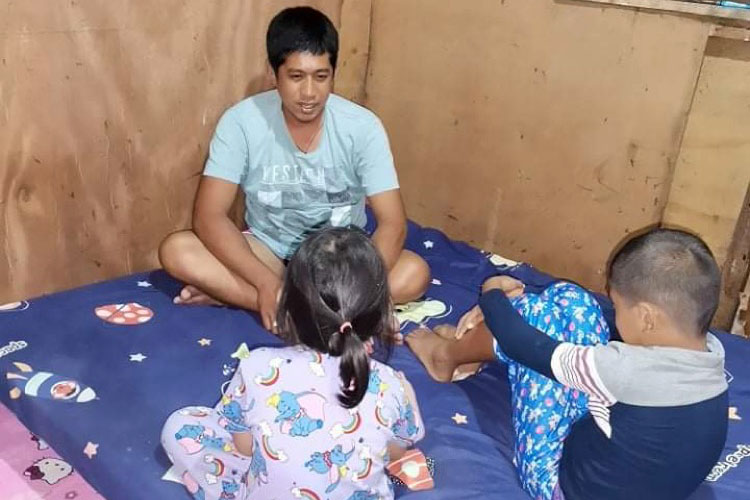
ZAMBOANGA CITY (MindaNews / 7 Oct) – A father of five needs to be tougher in times of crisis. This is exactly what Reynaldo Julian, delivery guy of a courier company here, has to deal with months following the declaration of the pandemic in the country and the months of quarantine that followed.
Rey, as he is called by people close to him, and his colleagues were all stunned when their manager met the workforce April last year, a month since the start of the lockdowns.
The announcement from the boss was cold – that the work schedule was to be changed from six working days to only three per week. This disheartened them all.
The company followed a no-work-no-pay policy. That sent Rey and his co-employees into computing in their minds what their receivables would be in the new work schedule.
Less the deductions for PhilHealth, Social Security System, and Pag-Ibig payments, Rey used to take home around P6,000 monthly. “Now we get only half the amount,” he lamented.

But he understood that his employer, like most companies all over the world, was having difficulty coping with the reduced volume of business.
Hence, Reynaldo’s work days have been fixed at three a week. Even when the quarantines eased and Zamboanga was categorized under General Community Quarantine (GCQ), things still had not gone back to normal at his workplace.
Rey admits that his company still has fewer clients compared to the time before the spread of COVID-19 began.
Rey, like the other delivery guys in the company, receives the minimum daily wage of P316.
He thought of what will happen to his children – Nathan, 13, on his fifth grade; Carldane, 11, likewise a fifth grader; Rey Matthew, 8, on second grade; Luigi Louis, 6, who is attending kindergarten; and Jamaicah Eunice, 4, who has yet to be at the daycare center.
He discussed the situation at work with his wife Nelfranee who, at 31, was attending the third year of her Social Work course at a local state university.
Nelfranee Julia (nee Rayno) understood the situation and decided to look for work as well. The barangay where they lived, Tumaga, needed volunteers at the Barangay Hall. She couldn’t get a job with fixed income, but she may volunteer, she was advised. To be a volunteer didn’t mean cash allowance, but they were given rice and canned goods, and this was very much welcomed as “better than nothing,” she said.
The couple and their children were still living with Nelfranee’s mother, and this caused Rey to be feeling awkward when his mother-in-law would yak at them being added responsibility to her.
It was an emotionally and economically struggling period for his family, Nelfranee shared.
His second son, Carldane, could not understand as he asked his parents: “Why are we living in difficulty now? Why don’t we always have money anymore? Why are you two working and there is no money?”
The questions were endless for the inquisitive Carldane, who couldn’t fathom the abrupt imposition of restrictions within the family.
“Why are we having difficulties? We have not eaten chicken for a long time now,” complained Luigi, the youngest son.
There were times they would eat only rice without any viand at all. The rice was courtesy of the barangay with Nel being a volunteer, but they could not get anything from the nearby retail store anymore as it would no longer allow debts.
The playful Luigi couldn’t understand why everyone stayed home. He wondered why seeing his friends in the neighborhood was a big “no.”
“Why can’t we go out of the house anymore?” he would ask.
Eventually in July this year, Nelfranee was taken in as one of the barangay’s contract tracers, with an allowance of P200 a day, or P5,000 per month, but only until the end of September. This added to the Julian household’s earnings to help alleviate their lives as family, for three months at least. But Rey stayed thankful in prayers as he thought of the many who were in tighter situations.
As the couple struggled with the financial demands, Rey and Nelfranee just decided to work together on their marriage and relations with their respective in-laws.
They agreed that it was not the time when they would have differing thoughts. They decided there must be no marital quarrels over money, as money could be found however difficult the times are. Their elder sons were asking too many questions that they themselves could not answer, and for the children to see friction between their parents might be too much.
Somehow, over the months during the pandemic, they were able to eat, even for just a meal in a day. Sometimes, the children would get a little piece of bread with chocolate or milk.
Water helped them manage through the day.
And they were thankful for the help, in the form of rice and canned goods, usually sardines.
“What matters most is that the family stays strong even when difficulties pile up,” Rey said.
Rey is among the many workers in the labor sector gravely affected during the pandemic, being a paid-by-day employee. His is one face that got slapped heavily – figuratively, of course – as their growing children got psychologically affected with the pandemic’s effects.
His company, itself reeling from the effects of the pandemic, could not offer anything beyond its workers’ basic pay.
“Pero jende mas yo reclama. Ta rendi yo gracias ya lang kay no hay canamon con quien ya quita (But I am not complaining. I even give thanks that no one among us was dismissed),” he said. (Frencie Carreon / MindaNews)
Staying strong when difficulties pile up
Source: Viral News Filipino

0 Comments